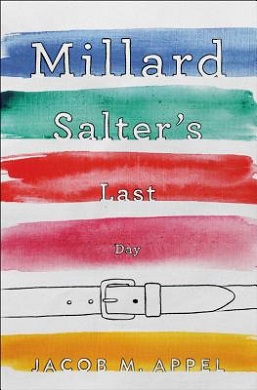Millard Salter's Last Day
Millard Salter's Last Day is a fictional narrative that explores the themes of life, aging, and the existential contemplation of one's own mortality. The story revolves around the protagonist, Millard Salter, a character who decides to confront the inevitability of death on his own terms. This article delves into the plot, characters, themes, and critical reception of the narrative, providing a comprehensive overview of its significance in contemporary literature.
Plot[edit | edit source]
The plot of Millard Salter's Last Day unfolds over the course of a single day, during which Millard Salter, a senior individual facing the twilight of his life, decides to end his life before age or illness can claim him. The narrative takes the reader through Salter's final day as he reflects on his past, contemplates the meaning of life and death, and prepares for his self-determined endpoint. Throughout the day, Salter interacts with various characters, including family members, friends, and strangers, each encounter adding depth to his reflections and decisions.
Characters[edit | edit source]
- Millard Salter - The protagonist, whose decision to end his life on his own terms serves as the central plot of the story.
- Family Members - Salter's family, including his children and possibly grandchildren, who provide insight into Salter's motivations and the impact of his decision.
- Friends and Acquaintances - Individuals from Salter's life who offer different perspectives on life, aging, and death.
Themes[edit | edit source]
The narrative explores several profound themes:
- Existential Reflection - Salter's journey is a deep dive into existential questions about the meaning of life, the nature of happiness, and the acceptance of death.
- Aging and Mortality - The story confronts the realities of aging and the inevitability of death, challenging societal attitudes towards the elderly and the dying process.
- Autonomy and Self-Determination - Salter's choice to end his life on his own terms raises questions about personal autonomy, ethical considerations of suicide, and the right to die.
Critical Reception[edit | edit source]
While this article does not provide specific reviews or critiques, narratives like Millard Salter's Last Day often generate discussion and debate among readers and critics alike. Such stories are praised for their courage in tackling difficult subjects and their ability to provoke thought and empathy regarding universally relevant themes.
See Also[edit | edit source]
Search WikiMD
Ad.Tired of being Overweight? Try W8MD's physician weight loss program.
Semaglutide (Ozempic / Wegovy and Tirzepatide (Mounjaro / Zepbound) available.
Advertise on WikiMD
|
WikiMD's Wellness Encyclopedia |
| Let Food Be Thy Medicine Medicine Thy Food - Hippocrates |
Translate this page: - East Asian
中文,
日本,
한국어,
South Asian
हिन्दी,
தமிழ்,
తెలుగు,
Urdu,
ಕನ್ನಡ,
Southeast Asian
Indonesian,
Vietnamese,
Thai,
မြန်မာဘာသာ,
বাংলা
European
español,
Deutsch,
français,
Greek,
português do Brasil,
polski,
română,
русский,
Nederlands,
norsk,
svenska,
suomi,
Italian
Middle Eastern & African
عربى,
Turkish,
Persian,
Hebrew,
Afrikaans,
isiZulu,
Kiswahili,
Other
Bulgarian,
Hungarian,
Czech,
Swedish,
മലയാളം,
मराठी,
ਪੰਜਾਬੀ,
ગુજરાતી,
Portuguese,
Ukrainian
Medical Disclaimer: WikiMD is not a substitute for professional medical advice. The information on WikiMD is provided as an information resource only, may be incorrect, outdated or misleading, and is not to be used or relied on for any diagnostic or treatment purposes. Please consult your health care provider before making any healthcare decisions or for guidance about a specific medical condition. WikiMD expressly disclaims responsibility, and shall have no liability, for any damages, loss, injury, or liability whatsoever suffered as a result of your reliance on the information contained in this site. By visiting this site you agree to the foregoing terms and conditions, which may from time to time be changed or supplemented by WikiMD. If you do not agree to the foregoing terms and conditions, you should not enter or use this site. See full disclaimer.
Credits:Most images are courtesy of Wikimedia commons, and templates Wikipedia, licensed under CC BY SA or similar.
Contributors: Prab R. Tumpati, MD

